
views
Exercising Your Heart Muscle

Talk to your doctor. Strengthening your heart through exercise can be as simple as taking a daily walk, but it is essential that you first get a professional assessment of your current heart health and overall fitness. If you push too hard and too fast, ignore underlying health conditions, or fail to give your heart a proper workout, you may end up doing more harm than good. Consult your physician about your current risk factors for heart disease and an overall assessment of your heart health. From there, you can work together to develop an appropriate exercise regimen for strengthening your heart and, in the process, hopefully reducing your risk for cardiovascular issues.

Get up, and get moving. Unlike other muscles, you heart is always working. However, long stretches of sedentary behavior like sitting provide no impetus for your heart to grow stronger. Even standing instead of sitting, or pacing around instead of standing still, will make your heart work a bit harder. Replacing a sedentary lifestyle with a more active one can help strengthen your heart and reduce your risk of heart disease by half at the same time. Even just thirty minutes of mild to moderate physical activity per day can benefit your heart health. One thirty-minute walk or three ten-minute walks each evening are enough for most people to gain some benefits.
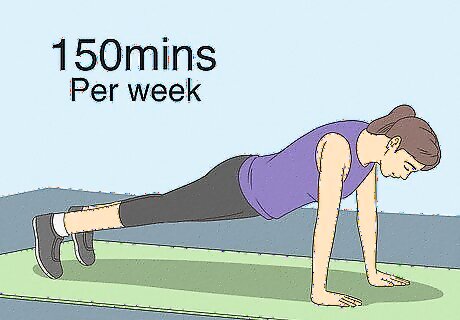
Aim for 150 minutes of moderate exercise per week. In addition to getting up and moving around more often, you should focus on getting two and a half hours of moderate exercise per week in order to strengthen your heart muscle. Alternatively, and depending on your fitness level and your doctor’s advice, 75 minutes of vigorous exercise per week will achieve the same results. To achieve moderate exercise, your heart and breathing rates should increase, but you should not be so winded that you are unable to carry on a conversation. For many people, activities like brisk walking, dancing, raking leaves or gardening, or playing with children or pushing a stroller constitute moderate exercise. Divide your workout into time intervals that work for you. Exercise in intervals of ten minutes or more at a time, depending on your schedule. Don't skip exercise just because you can't perform for 30 minutes or more continuously. With vigorous exercise, you will be breathing hard enough that it will be difficult to carry on a conversation. In either case, work with your doctor to determine the right level of exercise for your heart.
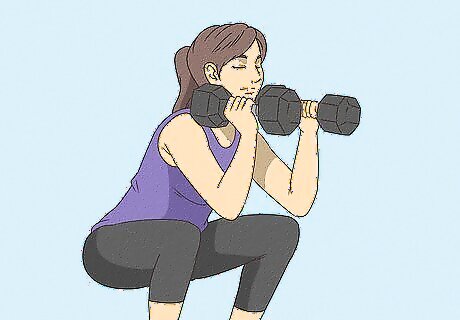
Supplement your routine with strength training. There are no weight-training exercises that specifically benefit your heart, because it is a unique muscle with a distinctive function. However, regular strength training will give your heart a workout and improve your overall fitness level, which in turn makes it easier for your heart to function properly. To build and maintain muscle and benefit your heart muscle, aim for two to three strength training sessions per week. Depending upon your fitness level, these sessions may or may not involve the use of weights. Once again, consult with your physician about the type of strength training that is right for you. Pushing too hard or using improper technique could end up hurting your heart.
Supporting Heart Health

Embrace a heart-healthy diet. Excessive amounts of saturated fat, sodium, and sugar constrict or clog up blood vessels and make your heart work harder in the wrong way, by creating an inefficient or even damaged cardiovascular system. On the other hand, heart healthy foods can support proper, efficient heart function and facilitate the strengthening of your cardiovascular system. Whole vegetables and fruits contain vitamins, minerals, and fiber that can help prevent plaque development in blood vessels. The fiber in whole grain foods is likewise beneficial in this regard. Lean proteins like chicken, fish, beans, and lowfat yogurt offer important nutrients without excessive saturated fat. Some lean proteins also provide omega-3 fatty acids, which in basic terms help lubricate your blood vessels and keep your cardiovascular system running smoothly. The most recent version of the official U.S. dietary guidelines was released in January 2016, and it focuses on making adjustments to your individual “eating pattern” to include a wider variety of healthy food choices. The guide also includes sample U.S.-style, Mediterranean-style, and vegetarian-style eating patterns for inspiration, and recommended daily amounts of various foods based on age, sex, and activity level.
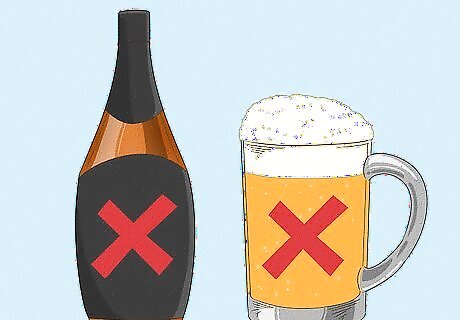
Drink alcohol in moderation. A growing body of evidence indicates that moderate alcohol consumption can reduce your risk of cardiovascular disease, perhaps by as much as one-third. Going beyond the recommended limits for moderate consumption, however, negates this benefit, and excessive alcohol consumption opens you up to a host of possible health problems, heart-related and otherwise. One to two standard-size alcoholic beverages per day (up to 14 per week) is considered "moderate," and seems to produce the greatest cardiovascular benefit. Averaging 15 or more drink units per week begins to negate this benefit, and consuming 21 or more units weekly (or more than four in any single day) is generally considered excessive and thus harmful. One drink unit is in about half a pint of normal-strength beer, two thirds of a small glass of wine, or one small pub measure of spirits.

Get adequate sleep. The average adult requires 7-9 hours of sleep nightly, yet many fail to reach that average. The heart, like every other part of the body, needs a regular period of relative rest to recharge for the following day. Sufficient restful sleep enables your heart and body to be revitalized, and also can reduce stress levels and blood pressure. If you wake up in the morning without the aid of an alarm and feel refreshed, that is a good sign that you are getting enough sleep. Studies have indicated that people that get between 7-9 hours of sleep per night have less calcium deposits in their arteries (which impede blood flow) than those who get either less or more than this recommended amount of sleep. How to Prevent Cardiovascular Disease addresses the need for adequate sleep, along with providing useful information on a range of topics like exercise, diet, smoking cessation, and stress reduction.
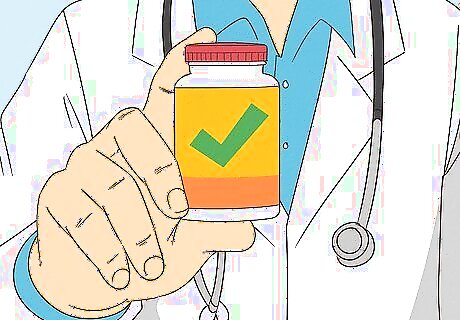
Work as a team with your doctor. In addition to getting an assessment of your current heart health and recommendations for strengthening it, discuss your concerns about and risks for developing cardiovascular disease with your physician. Along with lifestyle changes, talk about whether certain medications may be right for you. If you do decide to take medications, take them as prescribed and report any side effects. For instance, your doctor might prescribe statins to reduce bad cholesterol, beta blockers to reduce blood pressure and heart rate, or calcium channel blockers that relax arterial walls. Or, you may be prescribed a daily low-dose aspirin, which thins the blood and thus makes blockages less likely. Modern medicines can do wonders, but in the end it is up to you to make the necessary lifestyle changes to strengthen your heart and reduce your risk of cardiovascular troubles.
Avoiding Unnecessary Stresses
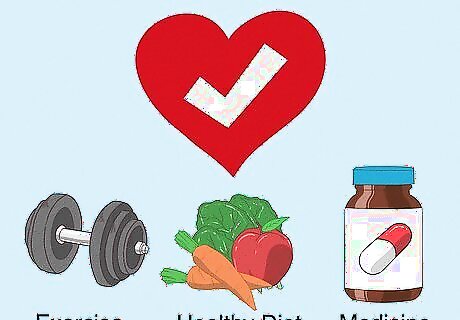
Reduce elevated LDL cholesterol, blood pressure, and/or blood sugar levels. Making your heart work harder through proper exercise is beneficial and strengthens the muscle. Making it work harder because of narrowed or blocked arteries creates inefficient functioning and greatly increases your risk of ailments like heart attacks and strokes. Elevated levels of LDL cholesterol, blood pressure, and/or blood sugar are significant risk factors for cardiovascular disease, but they can be improved with diet, exercise, and medication. LDL or “bad” cholesterol sticks to arterial walls and reduces blood flow, while HDL or "good" cholesterol helps keep clean arteries clear. LDL cholesterol levels can be lowered by a combination of reducing intake of saturated and trans-fats, exercising more, and possibly taking cholesterol-lowering medications like statins under the care of a physician. High blood pressure refers to an increase in the force of blood pressing on arterial walls, which can cause damage that makes arteries more susceptible to blockage. A blood pressure reading of 120/80 (systolic/diastolic) is considered normal, while a systolic reading of at least 140 or a diastolic reading of at least 90 usually indicates the need for remedial action via diet, exercise, and possibly medication. Elevated blood sugar levels, even before reaching the point of a diabetes diagnosis, can also damage arteries and increase the risk of cardiovascular disease. Here again, diet, exercise, and (if prescribed) medication are the keys to reducing blood sugar levels.

Stop smoking. Chemical compounds in tobacco contribute to atherosclerosis (narrowing of arteries), while the carbon monoxide in smoke replaces some of the oxygen in your blood. These changes increase the heart’s exertion while making it more inefficient, and also make arteries more susceptible to blockage. No amount of exposure to smoking or other tobacco products is safe, and quitting can be a very difficult process. Thankfully, even longtime smokers gain health benefits almost immediately after stopping. Five years after quitting, former smokers have about the same risk of cardiovascular disease as comparable non-smokers. Take a look at How to Quit Smoking if you want some good ideas on how to quit.
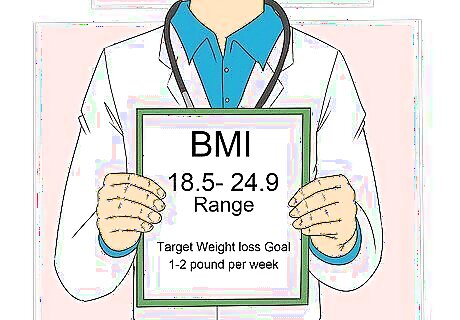
Shed excess body weight. Carrying excess body weight is essentially a gateway to many of the risk factors for heart disease, such as high cholesterol, high blood pressure, and diabetes. Being overweight can make your heart work harder in order to function normally, which is not the type of workout that strengthens the heart muscle. Excess weight in the midsection seems particularly conducive to an increased risk for cardiovascular disease. While it is far from a perfect measure of an individual’s weight status or possible need for weight reduction, your Body Mass Index (BMI) can serve as a useful guide. A BMI of over 25 is typically associated with a higher risk of cardiovascular disease. Consult with your doctor regarding your ideal BMI range and your target weight loss goal (if needed). How to Lose Weight the Healthy Way provides a wide range of advice on shedding pounds smartly.

Lower your stress level. Living with excess stress can negatively impact your sleep patterns and increase your blood pressure, both of which can be damaging to your cardiovascular health. The first step toward reducing stress levels is identifying your stressors; from there, you can utilize the “Four A’s” of stress reduction — avoid, alter, adapt, and accept — to develop effective ways of managing your stress. Avoid: Reduce your exposure to sources of stress. You can avoid stress in many different ways, such as leaving earlier to avoid traffic, declining additional work or responsibilities, or changing who you spend your time around. Alter: Attempt to reduce the severity of a stressor by changing the source. This could be done by changing your own behavior or communicating with others about theirs. For example, you could ask your partner to cook dinner one night if always cooking stresses you out. You can also try to reduce the amount of time you're exposed to stressors; for example, if you are really bothered by a certain neighbor, tell yourself you'll only go to the neighborhood barbecue for an hour. Adapt: Change your expectations and standards to better match your reality. Identify negative thoughts when they start, and try to replace them with positive thoughts or images to improve your mood and motivation. Attempt to place activities and events in perspective to identify what is important to you in the long run and what is not. For example, if you're late to work, remind yourself that it's just one day and you were only five minutes late, rather than feeling guilty about it for the whole day. Accept: In some cases you will have to accept a source of stress and not be able to significantly alter it. In these cases, it may help to be open with others regarding your feelings and identify positive things in your life to avoid focusing on the negative. Take these sources of stress as learning opportunities where you can learn to cope with stress well. If you need help managing stress, seek assistance from your doctor and/or a mental health professional. It can benefit your emotional and physical health, and help your heart in particular. Check out How to Reduce Stress as well.














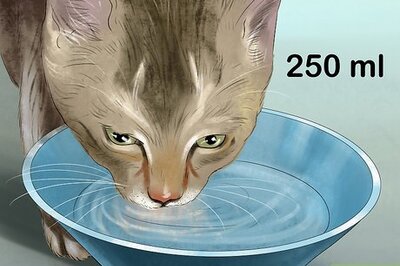




Comments
0 comment